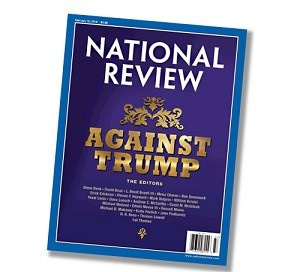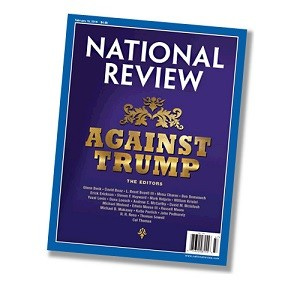
Thursday night on Megyn Kelly's show, National Review editor Rich Lowry announced details of his magazine's latest issue titled "Against Trump."
As Lowry explained to Kelly, there is a concern among many conservatives in this country that Donald Trump is not a candidate who will espouse conservative principles if he goes on to become the Republican nominee and eventually our president.
"If you truly are conservative, you believe in ideas and in principles," Lowry said. "It’s not just attitudes. It’s not just who you dislike. It’s limited government. It’s the Constitution. It’s liberty. Those are the things that truly make this country special. And they are basically afterthoughts to Donald Trump. He almost never talks about them. And if you’re truly a conservative, you have a consistent record. We all change our minds on a few things every now and then when the facts change. But he has been on the other side on big hot-button defining issues like abortion, gun control, taxes and even immigration."
The Against Trump issue presents essays from 22 top conservative commentators, including Glenn Beck, Thomas Sowell, Erick Erickson, Dana Loesch, Brent Bozell, and Cal Thomas. Each of them makes their case for why Donald Trump should not be the GOP nominee. Most of the essays are thoughtful and measured. Others take a sharper tone, but all should strike an objective reader as having legitimacy.
Regular columnists for the National Review (including Jonah Goldberg, Charles Cooke, and Kevin Williamson), and several of those who participated in the issue, were active on Twitter at the time of the Thursday night unveiling (and the hours that followed). They were clearly armed not only to promote the issue, but also take on the anticipated surge of Internet fury directed at them by die-hard Trump supporters who have demonstrated that they don't take criticism of their guy lightly.
Boy did that fury come — often in the form of vile, ethnic slurs directed personally at the writers.
As Dana Loesch later put it, "Trump supporters have called me a whore, slut, told me I should die, said I had abortions, and attacked my marriage. I win the Internet!"
And no, Loesch was not exaggerating. I witnessed it. Others involved in the project dealt with antisemitic and homophobic insults. The furor was similar to the one directed against Megyn Kelly months ago, after she dared to ask Trump a question he didn't like during the first GOP debate.
Again, Thursday night's backlash was expected. What wasn't expected (at least I didn't see it coming) was the treatment that the mere concept of the issue received from many the next day on the Fox News channel, where conservative thought has long been granted not only a respectful platform, but has also contributed greatly to the network's runaway success.
The reactions of several Fox personalities seemed to mirror the sentiment FNC host Jeanine Pirro expressed on Twitter that morning: "The National Review needs to get in line with the rest of the Republicans. How dare they trash the frontrunner Donald Trump!"
Pirro's comment wasn't designed to mock irate critics of the magazine issue (as it originally appeared). Her statement was shockingly a literal representation of her thoughts, which was evident from her television appearances later that day.
"I think it’s a hit-job, I think it’s a put-up job," said Fox pundit, Peter Johnson, Jr. on Outnumbered. "I don't have any sense of credibility about it."
"These words should disturb every American," said co-host Harris Faulkner. "He [Trump] is not deserving of conservative support in the caucuses and primaries. Whose job is it to decide who gets to be where? It’s the voters who decide. It is not any particular party. That’s offensive on its face."
Disturb every American? Offensive on its face? This was in reaction to some conservatives voicing their opinion that Trump doesn't deserve to represent their beliefs?
Co-host Andrea Tantaros faulted the National Review for a lack of credibility, saying that instead of criticizing Trump, they should write about why Trump is resonating with so many in the Republican base, and direct their magazine's fire at the GOP establishment.
Tantaros later took to the Internet, tweeting: "NRO ENDORSED Romney & McCain & gave us W's wars, huge deficits, amnesty, bailouts. They helped create Trump's rise."
As National Review writer Kevin Williamson soon pointed out, the magazine endorsed Romney over McCain in 2008, and did not endorse Romney in 2012.
Later on The Five, Eric Bolling expressed worry that the essays would provide more fuel for Democrats to use against Trump if he made it to the general election — a concern suspiciously hard to find during Trump's trashing of his fellow Republican candidates throughout the primary.
Co-host Jesse Watters was downright incensed that the magazine dared to call into question Trump's conservatism.
"Everyone's now saying, oh he doesn't check this box, he doesn't check this box," complained Watters. "Do you know what box is important to check? Filling up 40,000-people stadiums on a Tuesday night. That's the box that counts on election day. I don't think principles matter if you can't get elected and institute those principles. And I think a lot people now are putting pure conservatism over the country."
Some pretty remarkable statements came out of Watters' diatribe. Aside from the obvious point that the principles-don't-matter attitude is precisely why the National Review felt compelled to make its voice heard, it is a fallacy to suggest that Trump has demonstrated himself to be the most electable candidate in a general election match-up. National polls reveal a far different story, in fact. Beyond that, the notion that offering a conservative-based criticism of Trump is "putting pure conservatism over the country" is ridiculous on its face.
The Republican Party is the conservative party in this country. Basic conservative fundamentals are what the party represents and what distinguishes it from the Democratic Party. Most of the people who wrote essays for the National Review issue aren't demanding conservative purity; I'm not sure a case could be made that any of them are. What they want is a Republican candidate who is educated in, and has a respect for fundamental conservative principles. They want someone who will at least be guided by those principles in the way they govern.
They've seen little evidence that Trump is that person.
How is their concern not valid, especially when you look at several of Trump's past statements (including some recent ones) that suggest a complete disregard (or outright unawareness) of conservative sensibilities? A PAC called "Our Principles" recently put a video together that illustrates the point quite honestly and effectively: The Trump Tapes: Vol. 1. I would urge anyone who cares about the 'conservative' argument to watch it.
Now, if we want to talk about people who have been demanding conservative purity, one has to look no further than Fox News hosts Sean Hannity and Eric Bolling, who had spent years doing precisely that on their respective television shows. They routinely trashed Republican politicians that didn't meet a stringent set of hard-line conservative criteria. Of course, that all changed the moment their personal friend Donald Trump entered the presidential race. Since then, they've been focused more on slobbering over the greatness of their buddy.
Jesse Watters went on to say in his appearance on The Five: "Listen, this guy's [Trump's] Teflon. He can go on SNL, Meet the Press, whatever... And you're going to throw that away because he supports something like... he supports eminent domain? Eminent domain? I heard eminent domain was a reason. Come on!"
Again, Watters misses the point. No one's going to vote or not vote for Donald Trump based solely on his support for eminent domain. However, his stance on (and obvious enthusiasm for) the practice gives people a clearer sense of Trump's philosophy on the role government should play in society. Trump doesn't just support eminent domain in the name of things like public transportation. He supports it (and has used it) in the name of private wealth. That reveals an ideology worthy of discussion, does it not?
These are all issues that can be debated separately, of course. What I find disturbing isn't that people on Fox News would have a problem with commentary written in a conservative magazine. What I find disturbing is that these people's problem seems to be with the mere fact that conservative criticism was written about an individual that they either share a personal relationship with, or have gone out of their way to defend (or overlook) when he, himself, has dealt out criticism of others that was both incendiary and unfair.
The National Review essays are neither, but if you listen to some of the people I've mentioned, they're supposed to be dangerous and offensive to our country. How?
What I find particularly striking is that I've heard very little criticism at all of the actual content of the essays. I'm not even convinced their most passionate critics have even read what's in them. The uproar seems to be confined to the fact that the issue was published, and could potentially (but not likely) do damage to the current GOP front runner.
Make no mistake about it. There was a clear sense of betrayal that led to conservative thought being bastardized on Friday, on a supposedly conservative news network. I suspect that if the target of the National Review's criticism were a so-called "establishment Republican," or really any Republican politician other than Donald Trump, we wouldn't have seen nearly that level acrimony (if any at all).
This suggests a deep-seated problem that I hope people behind the scenes at Fox take a look at.











